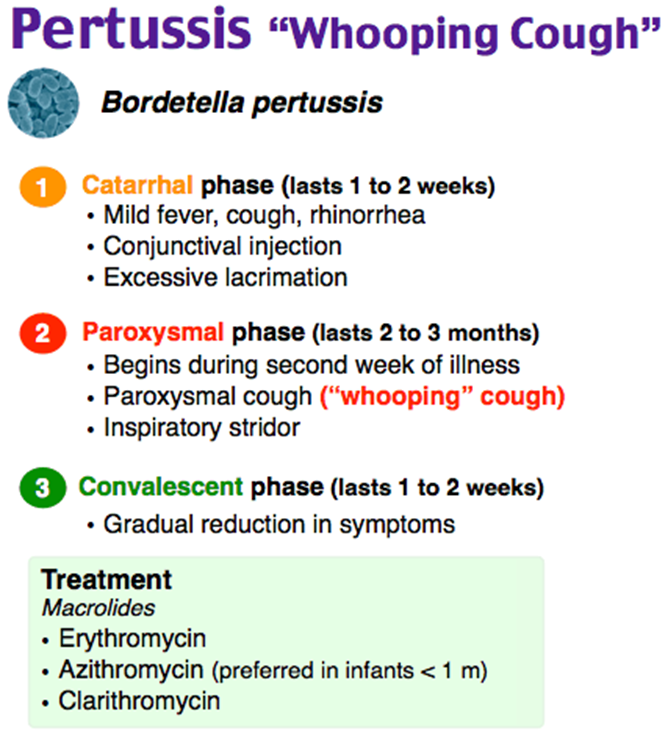The nurse provides home care instructions to the parents of a child hospitalized with pertussis who is in the convalescent stage and is being prepared for discharge. Which statement by a parent indicates a need for further instruction?
Coughing spells may be triggered by dust or smoke."
We need to maintain droplet precautions and a quiet environment for at least 2 weeks.
"We need to encourage our child to drink fluids.
Vomiting may occur when our child has coughing episodes."
The Correct Answer is B
A. Coughing spells may be triggered by dust or smoke:
Incorrect: This is a correct statement. Irritants like dust or smoke can trigger coughing spells in a child recovering from pertussis.
B. We need to maintain droplet precautions and a quiet environment for at least 2 weeks.
Correct Answer: Pertussis is highly contagious during the catarrhal and paroxysmal stages, but once the child has reached the convalescent stage (usually after 2-4 weeks of illness), the risk of spreading the infection decreases significantly. Continuing strict droplet precautions and a quiet environment for two weeks after the convalescent stage is not necessary.
C. "We need to encourage our child to drink fluids":
Incorrect: This is a correct statement. Encouraging fluid intake is important to prevent dehydration, especially during coughing spells.
D. Vomiting may occur when our child has coughing episodes:
Incorrect: This is a correct statement. Vomiting can be a common occurrence during coughing episodes in pertussis due to the forceful nature of the cough. Parents should be aware of this symptom.

Nursing Test Bank
Naxlex Comprehensive Predictor Exams
Related Questions
Correct Answer is C
Explanation
A. "Range-of-motion exercises must be performed every day."
Explanation: While range-of-motion exercises are important for maintaining joint flexibility in juvenile idiopathic arthritis, it is not advisable to perform these exercises during painful exacerbations. The frequency and intensity of exercises may need to be adjusted based on the child's current condition.
B. "Administer additional pain medication before performing range-of-motion exercises."
Explanation: While pain management is important in the care of a child with juvenile idiopathic arthritis, relying solely on pain medication before exercises may not be the most effective approach. Isometric exercises that are less likely to cause pain can be a better option during exacerbations.
C. "Have the child perform simple isometric exercises during this time."
Explanation:
During a painful exacerbation of juvenile idiopathic arthritis, it is important to maintain joint flexibility and prevent joint contractures. Simple isometric exercises that do not involve joint movement can help in maintaining muscle strength and joint flexibility without exacerbating pain. Range-of-motion exercises may be too painful during an exacerbation, but isometric exercises can be less painful and still beneficial.
D. "Avoid all exercise during painful periods."
Explanation: Complete avoidance of exercise during painful periods is not recommended. Maintaining joint flexibility and muscle strength is important for managing juvenile idiopathic arthritis. However, the type and intensity of exercises should be adjusted based on the child's pain level during exacerbations.
Correct Answer is ["5.3"]
Explanation
To calculate the dose of acetaminophen, you can use the following formula:
Dose (in mg)= Weight (in kg) × Dose (mg/kg)
First, convert the weight from pounds to kilograms:
Weight (in kg)= Weight (in lb)/ 2.2
Weight (in kg)=28 lb/ 2.2 ≈ 12.73kg
Now, calculate the dose:
Dose (in mg) =12.73 kg × 10 mg/kg ≈ 127.3 mg
Next, determine how many milliliters (mL) of the available acetaminophen solution (120 mg/5 mL) contain the calculated dose:
Volume (in mL)=Dose (in mg)/Concentration (in mg/mL)
Volume (in mL) =127.3 mg/( 120 mg/5 mL)
Volume (in mL)≈127.3 mg / 24 mg/mL ≈ 5.304 mL
Therefore, the nurse should administer approximately 5.3 mL of acetaminophen.
Whether you are a student looking to ace your exams or a practicing nurse seeking to enhance your expertise , our nursing education contents will empower you with the confidence and competence to make a difference in the lives of patients and become a respected leader in the healthcare field.
Visit Naxlex, invest in your future and unlock endless possibilities with our unparalleled nursing education contents today
Report Wrong Answer on the Current Question
Do you disagree with the answer? If yes, what is your expected answer? Explain.
Kindly be descriptive with the issue you are facing.
